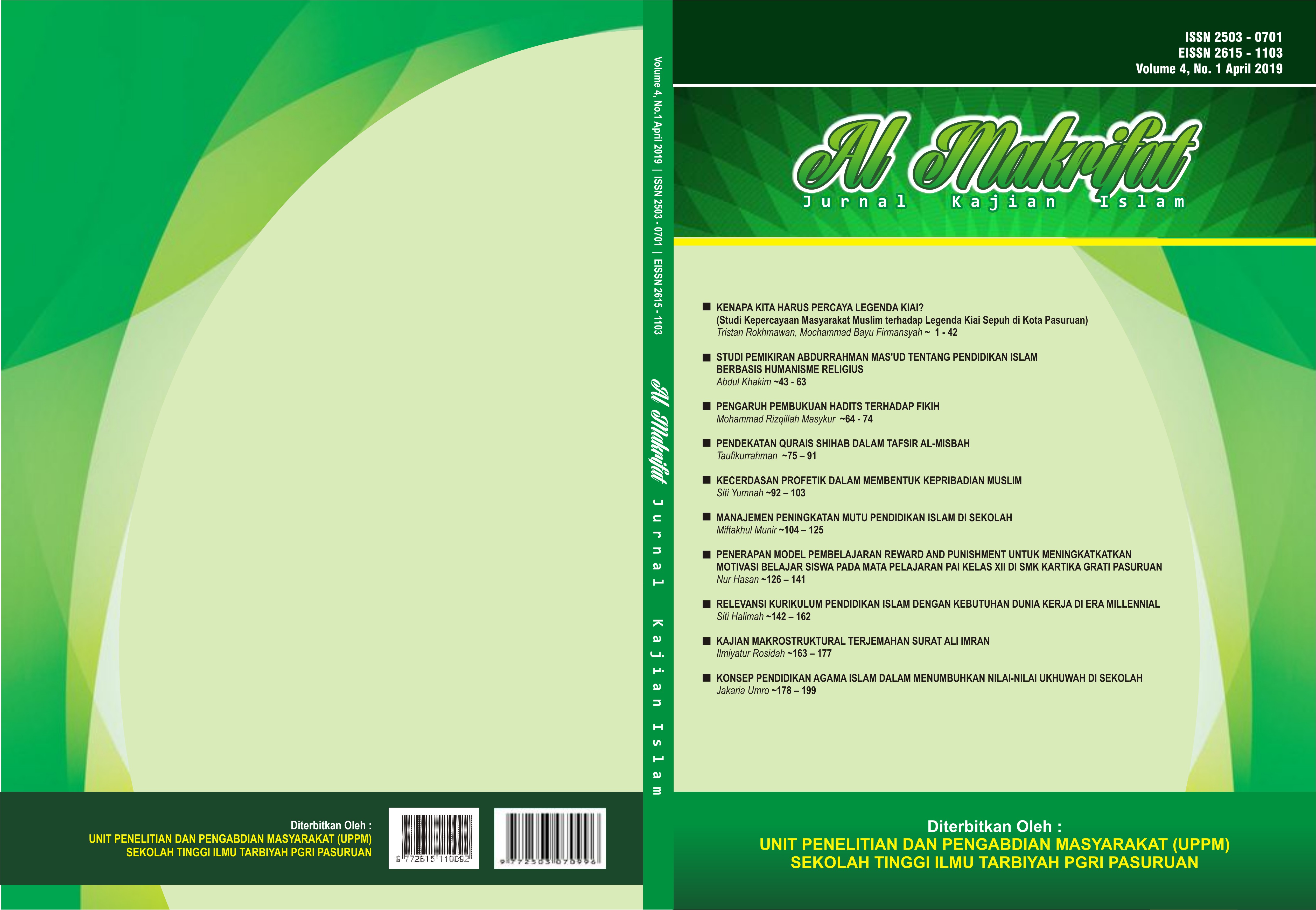Konsep Pendidikan Agama Islam Dalam Menumbuhkan Nilai-Nilai Ukhuwah Di Sekolah
Abstract
Seeing the behavior of teenagers or students today, who generally like to hang out rather than study, spend time playing on the streets, and what makes them more concerned is that they prefer fighting or brawl, mutual hostility between groups and never think that all humans are God create in this universe is brother, then we should be concerned. The many conflicts that occur among teenagers or students are a concern for all of us, because we are brothers. It seems the teenagers or students are now hypnotized by hostility between siblings. Therefore, from this moment on we must be able to build a sense of care among fellow humans for the progress of this nation. From now on let us grow and intend in our hearts to uphold the values ​​of Ukhuwah among fellow humans. Religious education is an effort to strengthen the faith and devotion to the Almighty God according to the religion adopted by students. Islamic education in schools is expected to be able to form personal piety and at the same time social piety so that Islamic religious education is expected to be able to create and foster the values ​​of ukhuwah in school. Islamic education carried out in schools is one of the education to foster student personality development in a positive direction. School education has a strategic role in the formation of national morality and morals in order to build a character that is a nation that is intelligent, honest, responsible and willing to share in goodness. On this basis, it is necessary to renew the thinking, study and research on Islamic Education in fostering the values ​​of ukhuwah in schools, including the reconstruction of theological, philosophical, substantive aspects, methodology and the learning system. With the hope that Islamic Education can take place effectively in order to foster the values ​​of ukhuwah in school.References
Hamba. 2010. Menikmati Hidup Cara Rasulullah. Depok: Pustaka Ibnu Abas.
Hasan, Tholhah. 2003. Prospek Islam dalam Menghadapi Tatanan Zaman. Jakarta: Lantabora Press.
Khairuman, Badri. 2004. Moralitas Islam. Bandung: Pustaka Setia.
Madjid, Nurcholis. 2008. Islam Doktrin dan Peradaban. Jakarta: PT. Dian Press bekerjasama dengan Paramadina Press.
Madjid, Nurcholish. 1999. Pengantar dalam A. Malik Fajar, Reorientasi Pendidikan Islam cet. I. Jakarta: yayasan pendidikan Islam Fajar Dunia.
Mahmud, Ali Abdul Halim. 1998, Fiqh Responsibilitas: Tanggung Jawab Muslim dalam Islam. Jakarta: Gema Insani.
Mubarok, Zaim El. 2009. Membumikan Pendidikan Nilai. Bandung : Alfabeta.
Muhaimin. 2009. Rekonstruksi Pendidikan Islam, dari Paradigma Pengembangan, Manajemen Kelembagaan, Kurikulum hingga Strategi Pembelajaran. Jakarta. Raja Grafindo Persada.
___________2010. Pengembangan Kurikulum Pendidikan Agama Islam di Sekolah, Madrasah, dan Perguruan Tinggi. Jakarta. Raja Grafindo Persada.
Rosyadi, Khoirun. 2004. Pendidikan Profetik. Yogyakarta: Pustaka Belajar.
Shihab, M. Quraish. 1997, Wawasan Al-Qur’an. Bandung: Mizan.
________________. 2007. Membumikan Al-Qur-an “Fungsi dan Peran Wahyu dalam Kehidupan Masyarakat, Bandung: Mizan.
Suhardi, Fathur. 1994. Prinsip Ukhuwah dalam Islam. Solo: Hazanah Ilmu.
Tim Balai Pustaka. 2007. Kamus Besar Bahasa Indonesia. Jakarta: Balai Pustaka.
Tim Pengembang Ilmu Pendidikan IP-UP.2009. Ilmu dan Aplikasi Pendidikan I: Ilmu Pendidikan Teoritis, Bandung: IP-UP.
Undang-undang SISDIKNAS No. 20 Tahun 2003.
Ulwan, Abdullah Nashih. 1990. Pendidikan Anak Menurut Islam. Bandung: Remaja Rosdakarya.




